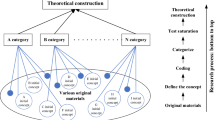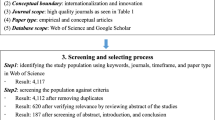Abstract
In this paper spatial and temporal dimensions of technical innovations will be dealt with in both a theoretical and an empirical sense. In this framework, a first aim is to make a systematic typology of different innovations. As far as the regional context is concerned, a theoretical framework will be designed for identifying which regions will most likely “specialize” in certain kinds of innovations. In this respect, our analytical framework can ascertain, for example, whether the central (metropolitan) areas tend to be in a favourable position regarding high quality product innovations, while the more peripheral zones will be more oriented towards process innovations. These hypotheses are then tested, using industrial survey data, by means of contingency table and regression analysis. In general, the empirical results give (some) support to the above mentioned “spatial specialization” hypothesis.
Similar content being viewed by others
References
Andersson, A. E., and B. Johansson (1984), Knowledge Intensity and Product Cycles in Metropolitan Regions, Contributions to the Metropolitan Study, no. 8, Laxenburg.
Aydalot, Ph. (1984), Reversals of Spatial Trends in French Industry since 1974. In: J. G. Lambooy (ed.),New Spatial Dynamics and Economic Crisis, pp. 41–63, Finn Publ., Tampere.
Braverman, H. (1974),Labor and Monopoly Capitalism, Monthly Review Press, New York.
Camagni, R. (1984), Spatial Diffusion of Pervasive Process Innovation Paper prepared for the XXIV European Congress of the Regional Science Association, Milan.
Davelaar, E. J. and P. Nijkamp (1986), De Stad als Broedplaats van Nieuwe Activiteiten: Theorie en Onderzoek,Stedebouw en Volkshuisvesting, no. 2, pp. 61–66.
Elger, A., and H. Braverman (1983), Capital Accumulation and Deskilling,The Degradation of Work? (S. Wood, ed.), Hutchinson, London, pp. 23–45.
Feller, I. (1973), Determinants of the Composition of Urban Inventions,Economic Geography, vol. 49, pp. 47–58.
Freeman, C. (ed.) (1984),Design, Innovation and Long Cycles in Economic Development, Design Research Publ., Royal College of Art, London.
Hagerstrand, T. (1967),Innovation Diffusion as a Spatial Process, University of Chicago Press, Chicago.
Hoogteijling, E., J. W. Gunning and P. Nijkamp (1986), Spatial Dimensions of Innovation and Employment: Some Dutch Results, In:Technological Change, Employment and Spatial Dynamics (P. Nijkamp, ed.), pp. 221–243, Springer Verlag, Berlin.
Hoover, E. M. and R. Vernon (1959),Anatomy of a Metropolis, Harvard University Press, Cambridge.
Howells, J. R. L. (1984), The Location of Research and Development: Some Observations and Evidence from Britain,Regional Studies, Vol. 18, pp. 13–29.
Jacobs, J. (1961),The Death and Life of Great American Cities, Vintage Books, London.
Kleinknecht, A. (1986),Crisis and Prosperity in Schumpeterian Innovation Patterns, MacMillan, London.
Kleinknecht, A. and A. Mouwen (1985), Regionale Innovatie (R&D): Verschuiving naar de ‘Halfwegzone’? In:Innovatie en regio, W. T. M. Molle (ed.), pp. 125–142, Staatsuitgeverij, Den Haag.
Koerhuis, H. and W. Cnossen (1982), De Softwareen Computer-servicebedrijven, Sociaal Geografische Reeks no. 23, Geografisch Instituut R. U. Groningen.
Kok, J. A. A. M., G. J. D. Offerman and P. H. Pellenbarg (1984), Innovatieve Bedrijven in Nederland, Sociaal Geografische Reeks no. 32, Geografisch Instituut R. U. Groningen.
Leone, R. A. and R. Struyk (1976), The Incubator Hypothesis: Evidence from Five SMSA's,Urban Studies, vol. 13, pp. 325–331.
Malecki, E. J. (1979), Corporate Organization of R and D and the Location of Technological Activities,Regional Studies, vol. 14, pp. 219–234.
Malecki, E. J. and P. Varaiya (1985), Innovation and Changes in Regional Structure,Handbook of Regional Economics, (P. Nijkamp, ed.), North-Holland Publ. Co., Amsterdam.
Mensch, G. (1979),The Stalemate Technology, Ballinger, Cambridge, Mass.
Nelson, R. D. and S. G. Winter (1982),An Evolutionary Theory of Economic Change, Harvard University Press, Cambridge.
Nijkamp, P. (ed.) (1986),Technological Change, Employment and Spatial Dynamics, Springer Verlag, Berlin.
Norton, R. D. (1979),City Life Cycles and American Urban Policy, Academic Press, New York.
Oakey, R. P. (1981),High Technology Industry and Industrial Location, Gower, Aldershot.
Oakey, R. P., A. T. Thwaites and P. A. Nash (1980), The Regional Distribution of Innovative Manufacturing Establishments in Britain,Regional Studies, vol. 14, pp. 235–253.
Pred, A. (1977),City Systems in Advanced Economies, Hutchinson, London.
Sabal, C. (1982),Work and Politics, Cambridge University Press, Cambridge.
Thwaites, A. (1982), Some Evidence of Regional Variations in the Introduction and Diffusion of Industrial Products and Processes within British Manufacturing Industry,Regional Studies, vol. 16, pp. 357–381.
Author information
Authors and Affiliations
Additional information
This study was supported by the Netherlands Organization for the Advancement of Pure Research (ZWO), project number 46-155.
Rights and permissions
About this article
Cite this article
Davelaar, E.J., Nijkamp, P. The incubator hypothesis: Re-vitalization of metropolitan areas?. Ann Reg Sci 22, 48–65 (1988). https://doi.org/10.1007/BF01283652
Issue Date:
DOI: https://doi.org/10.1007/BF01283652




